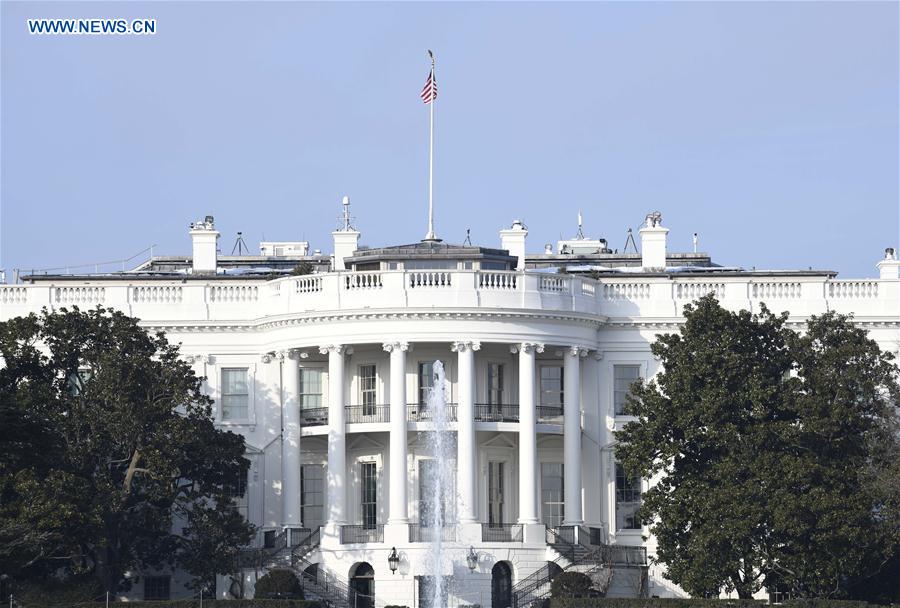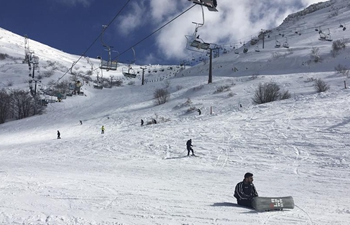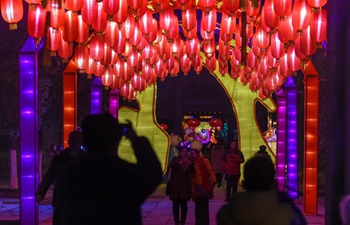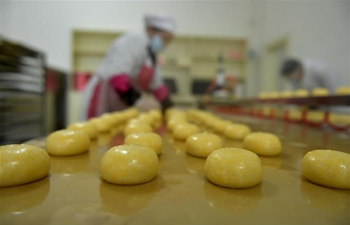
Photo taken on Jan. 18, 2019 shows the White House in Washington D.C., the United States. The White House said Friday that the second summit between U.S. President Donald Trump and Kim Jong Un, top leader of the Democratic People's Republic of Korea (DPRK), "will take place near the end of February." (Xinhua/Liu Jie)
WASHINGTON, Jan. 18 (Xinhua) -- With the United States on Friday announcing a forthcoming summit between President Donald Trump and top leader of the Democratic People's Republic of Korea (DPRK) Kim Jong Un, experts called for enhanced diplomatic efforts by both sides to achieve denuclearization and resolve other issues in their bilateral relations.
Following a meeting in the White House between Trump and Kim Yong Chol, vice chairman of the DPRK's ruling Korean Workers' Party Central Committee, White House Press Secretary Sarah Sanders said a leaders' meeting between the two countries "will take place near the end of February."
"President Donald J. Trump met with Kim Yong Chol for an hour and half, to discuss denuclearization and a second summit, which will take place near the end of February," Sanders said in a statement. "The President looks forward to meeting with Chairman Kim at a place to be announced at a later date."
Kyle Ferrier, a U.S.-based scholar of Korean studies, told Xinhua in an interview that Kim Yong Chol's visit to Washington suggests both sides are close to agreeing on the details for another summit between Trump and Kim Jong Un, the second after the one held in Singapore last June.
"It's not clear what exactly would be on the table in a second summit, but it would need to meaningfully advance diplomacy," said Ferrier, director of academic affairs and research at Korea Economic Institute of America, a Washington think tank.
Kim Yong Chol, who arrived in Washington on Thursday night, held what the U.S. State Department said was "a good discussion" with Secretary of State Mike Pompeo and Stephen Biegun, U.S. special representative for the DPRK on Friday noon. He then went to the White House to meet Trump.
Robert Palladino, deputy spokesman of the State Department, said in a statement that Pompeo and Kim Yong Chol discussed efforts to make progress on achievements at the Singapore summit, and that Biegun will travel to the Swedish capital of Stockholm Saturday through Tuesday "to participate in an international conference hosted by the Swedish foreign ministry."
The Swedish foreign ministry confirmed on Friday that DPRK Vice Foreign Minister Choe Son Hui had arrived in Stockholm for meetings with international experts, without providing further details.
Advancement of diplomatic engagement between Washington and Pyongyang, Ferrier said, "could include initial steps of denuclearization from Pyongyang" in exchange for "concessions from Washington."
The DPRK and the United States remain divided on what denuclearization implies.
Pyongyang insists that denuclearization should cover the entire Korean Peninsula and be achieved through a phased approach, whereas Washington demands a "complete, verifiable and irreversible" denuclearization of the DPRK, without which sanctions against Pyongyang - including those adopted by the United Nations Security Council and those imposed unilaterally by the United States - will be kept in place.
"The biggest obstacle with the denuclearization process right now is getting one side to budge from their entrenched position first," Ferrier said, adding that the announcement of a second summit "suggests that the U.S. is more open to a step-by-step process, which will help keep talks going."
Positive development emerged from both the DPRK and the U.S. sides after the Singapore summit, at which Washington pledged it would provide a security guarantee to Pyongyang in return for the latter's commitment to denuclearization.
Since the summit, the DPRK has halted nuclear and ballistic missile tests, dismantled the Tongchang-ri missile engine test site, and resumed the handover of the remains of U.S. soldiers who were buried in the DPRK during the war.
The United States, for its part, has suspended some of its joint military drills with South Korea. Earlier this month, the State Department signaled its intention to ease restrictions on humanitarian aid destined for the DPRK, allowing U.S. and international aid groups to deliver the assistance and supplies, according to reports by Foreign Policy magazine.
However, discussions between Washington and Pyongyang have reached a low after the Singapore summit failed to yield substantive results.
"For the moment, diplomacy remains preferable to alternatives. Talking has achieved more than symbolic gains," Patrick Cronin, senior fellow at the Hudson Institute, wrote in an article published Monday on the Foreign Policy magazine's website.
Cronin, who chairs the study of Asia-Pacific security at the Washington-based think tank, argued in the meantime that it is difficult for the United States and the DPRK to address reciprocity.
"Reciprocity works in theory but perhaps not in practice, when comparing the apples of peace agreements and sanctions relief with the oranges of denuclearization," he said.















